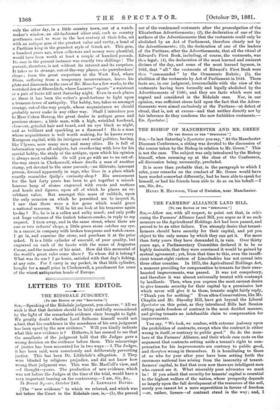LETTERS TO THE EDITOR.
THE RIDSDALE JUDGMENT.
THE EDITOR OF THE "SPECTATOR."]
SIR,—Speaking of the Ridsdale judgment, you observe, "All we wish is that that decision should be fairly and fully reconsidered by the light of the remarkable evidence since brought to light. We greatly doubt whether Lord Selborne himself would not admit that his confidence in the soundness of his own judgment has been upset by the new evidence." Will you kindly indicate what this new evidence is ? Hitherto, it has seemed to me that the assailants of the judgment held that tile Judges gave a wrong decision on the evidence before them. This miscarriage of justice has been accounted for in two ways :-1. The Judges, it has been said, were consciously and deliberately perverting justice. This has been Dr. Littled.ale's allegation. 2. They were blinded by religious prejudice, and did not know how wrong their judgment was. This was Mr. MacColl's view, and —I thought—yours. The production of new evidence, which was not before the Judges at the time of the trial, would have a very important bearing on the controversy.—I am, Sir, &c., 34 Dorset Square, October 24th. J. LLEWELYN DAVIES.
[The "new evidence" to which we referred, and which was not before the Court in the Ridsdaie case, is,—(1), the proved use of the condemned vestments after the promulgation of the Elizabethan Advertisements ; (2), the declaration of one of the authors of the Advertisements that the vestments could only be abolished by an Act of Parliament, therefore clearly not by the Advertisements; (3), the declaration of one of the leaders of the Puritans, after the Advertisements, that all the ritual of Edward's First Book, including, of course, the vestments, was then legal; (4), the declaration of the most learned and eminent divines of the day, and some of the most learned laymen, in 1641, that " all " the vestments of Edward's First Book were then " commanded " by the Ornaments Rubric ; (5), the abolition of the vestments by Act of Parliament in 1644. These facts are, in our judgment, irreconcilable with the view of the vestments having been formally and legally abolished by the Advertisements of 1566; and they are facts which were not argued and considered in the Ridsdale case. Nor, in our opinion, was sufficient stress laid upon the fact that the Adver- tisements were aimed exclusively at the Puritans—at defect of ritual, that is, not at excess—and that neither directly nor by fair inference do they condemn the now forbidden vestments.— ED. Spectator.]


































 Previous page
Previous page